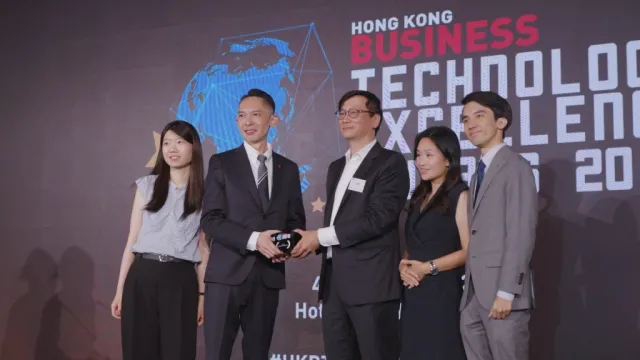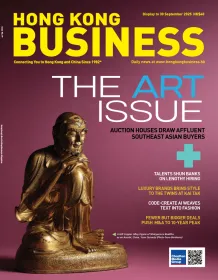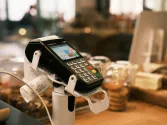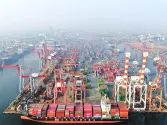
PwC Hong Kong's Michael Cheng on how the pandemic affected the supply chain
The consumer markets leader joins the panel of judges at Made in Hong Kong and Designed in Hong Kong Awards 2020.
Michael Cheng, Asia Pacific, Hong Kong, and Mainland China consumer markets leader at PwC Hong Kong, has over 34 years of professional assurance experience in Hong Kong and the United Kingdom. He also specialises in IPO advisory, business and due diligence reviews, asset injections and M&A activities in Hong Kong, Mainland China and Taiwan.
He is responsible for coordinating practice strategy and service delivery for companies in the Consumer Markets sector in Hong Kong, Mainland China and the Asia Pacific region.
Michael has extensive experience in public speaking on the general trend and outlook of the Hong Kong retail market and is a member of the Hong Kong Retail Management Association’s (HKRMA) taskforce on labour matters and strategy working group.
He is a member of the Hong Kong Institute of Certified Public Accountants and the Institute of Chartered Accountants in England and Wales. Michael is also a council member and chairman of the Audit Committee for UNICEF Hong Kong.
As one of the judges in HKB Made in Hong Kong and Designed in Hong Kong Awards, Hong Kong Business sat down with Michael as he shared his take on the global trade environment and how the pandemic affected the supply chain, as well as the opportunities for retail businesses and entrepreneurs amidst the crisis.
Which particular markets or sectors are your main focus? Can you share with us your work experience or any backstory that has contributed to your professional career?
With almost 34 years of professional assurance experience in Hong Kong and the United Kingdom. I have developed a strong passion in the consumer's market sector specialising in IPO advisory, business and due diligence reviews, asset injections and M&A activities in Mainland China and Hong Kong.
Currently, I am a member of the Hong Kong Institute of Certified Public Accountants and the Institute of Chartered Accountants in England and Wales, as well as the Council of the Hong Kong Committee for UNICEF. This year in November I was invited to take part in the organising committee of 2020 Retail Asia Conference providing consultation on themes and content direction.
What is your take on the global trade environment and how does it impact the supply chain? Which industries are staying resilient in these trying times? Where should the investors put their money so companies make investments to better position themselves in the market?
The current health crisis and evolving global trade environment have exposed the vulnerability of the global supply chain and accentuated the drawbacks of having a supply chain that is over-reliant on a single market or geography.
Many economies including mainland China and Hong Kong have experienced varying degrees of supply disruption of input materials due to factory shutdowns at the height of Covid-19. A number of consumer categories, especially high value-added items such as consumer electronics and medical equipment, which involve upstream and downstream supply, have seen a lengthening of their production cycles.
Overall, I think supply chain reconfiguration has become a lingering question for businesses as they manage sourcing risks and rethink their operation footprints. On the bright side, the recent signing of the Regional Comprehensive Economic Partnership (RCEP) between China and 14 other Asia-Pacific countries, which may see the removal of all tariffs in the trading bloc within 10 years, has added a positive spin to the global trade headwinds. Moreover, the dual circulation strategy devised by China also represents the country’s commitment to revive domestic consumption and promote regional economic integration. With that being said, I think the medium and long-term economic prospect would be a brisk one albeit temporary volatilities.
There is no doubt that the current pandemic, as well as global economic slowdown and trade turbulence, has brought seismic changes to different industries. Whilst traditional industries including hotels, catering, tourism, airlines, to name a few, suffered a massive blow to their operations and bottom lines, there are quite a few industries – many of which are characterised by the so-called new economy - that have been relatively resilient to the impact of this economic downturn.
As far as the traditional retail industry is concerned, general consumption has recovered but the magnitude of spending varies widely across categories. In particular, China’s luxury market has proven to be one of the most resilient and best-performing sectors, thanks to “revenge buying” of consumers who previously suppressed their shopping impulses due to the lockdown and inability to travel. This latent demand started to resurface as China’s economy has staged a speedy recovery since March.
To better position themselves to compete and grow in an uncertain market, businesses should first recognise a sea change in their operating environment and alter their business models accordingly. Time and speed are of essence. They need to understand how consumption patterns and people priorities may have changed and use this opportunity to re-evaluate their relationship with their customers.
In view of supply chain disruption, some enterprises have started to implement more efficient and larger-scale manufacturing models shaped by customer driven demands, or the C2M (Customer to Manufacturer) model, and have achieved considerable benefits in cost savings and improved customisation.
For instance, premium jewelry brand Chow Tai Fook has pioneered the C2M platform in mainland China, named D-ONE, through which it offers a unique customisation experience connecting new orders with its production bases in China. To cater to the growing demand for C2M products, Alibaba launched Special Offers, a new app on Taobao, which works directly with factories instead of brands to create C2M products.
Hence, businesses should develop more agile, real-time logistics strategies to respond to short-term irregular demand for certain merchandise or “hit items”. They would benefit from flexible sourcing to ensure stable supply by connecting directly to the production sources.
Moreover, the pandemic has brought a halt in tourist visits globally and hit retail sales hard. It is more important than ever for retailers to adopt digital and innovative tactics to effectively harness online platforms to compensate for falling offline sales. Businesses should also invest resources to improve digital fitness of their own employees so they are better equipped to serve consumers in a more online-dominated setting.
Where are the opportunities for retail businesses and entrepreneurs in Hong Kong in the middle and post-pandemic era?
There are a myriad of opportunities for businesses and entrepreneurs in the mid and post-pandemic era as driven by a number of emerging trends in consumer behaviours.
In fact, I have led a recent research report titled Recover, restart and regrow: How consumer trends ignite transformation in China’s New Retail, where we discussed the top emerging trends of the Chinese consumer market, and explored what companies can do to tap into these resulting opportunities.
Amongst the most obvious was the inexorable shift to online-based consumption during and post pandemic. Covid-19 has caused a massive offline-to-online migration of consumers across categories, especially in the digital arena such as remote office, video-conferencing, web-based education, online sales of fresh produce, e-sports and gaming. The Single’s Day festival this year has set another record of US$75.8b in gross sales over the 11-day gala, and eyeing the success of such a trend Hong Kong retailers are now recognising the growing prevalence of online shopping amongst local consumers as well.
Live streaming has gained prominence in recent years as a viable way to market, communicate, and sell products online. Some retailers in Hong Kong were quick to adopt live streaming through the combined use of KOLs and KOCs to drive online traffic and sales. KOL live streamers are internet celebrities who are paid by brands to generate traffic, stories, and engagement around products; whilst KOCs operate in the more fragmented mass market managing sales operations for smaller retailers.
On the other hand, the health crisis has forced people to take extra precautions on their personal hygiene, health, and long term well-being. Likewise, this is a perfect timing for retailers to become acutely aware of their customers’ concern for health and wellbeing. They should revisit and rebuild a more direct, genuine, and caring relationship by interacting with them at a deeper level.
On a broader level, I would advise Hong Kong business and entrepreneurs to look north for tremendous opportunities unleashed by the Greater Bay Area (GBA). In fact, in the consumer sector, Hong Kong-based brands, retailers and restaurant chains are stepping up in their pursuit of the GBA opportunities. For example, Watsons launched a cross-border membership program that can be used in all stores in the 11 cities in GBA, whilst Café de Carol formed a strategic partnership with eight major property developers in the area in 2020 to accelerate openings.
COVID-19 has altered consumer behaviours in a fundamental way, both online and offline, and we see that retailers in Hong Kong are keen to adopt these changes for long-term success and sustainable growth. Regardless of how the pandemic plays out, the reality of New Retail transformation will go on – with accelerated pace in digitalisation, proliferation in e-commerce, and adoption of emerging technology by consumers. Covid-19 has only acted as a catalyst to reveal shortcomings of the current business models and exacerbate transformation.
What are your thoughts on the entries for this year’s Made in Hong Kong Awards and Designed in Hong Kong Awards?
It was such an honour for me to be invited by HKB and flex my mental muscles as one of the judges for this year’s Made in Hong Kong Awards and Designed in Hong Kong Awards - particularly at a time of uncertainty that calls for innovative ideas and solutions to meet the present challenges.
Over the past four years the Awards programmes have earned public awareness and positive remarks in their effort in recognising excellent and innovative products and brands in Hong Kong. This year will be no exception. I believe, as Hong Kong is facing a vastly different and challenging atmosphere, it is more important than ever to collectively build, incentivise, and support the local business community, and in the process elevate the status of the Hong Kong Brand as a whole.
I would say the competition amongst the entries this year was very keen making my role as a judge even more challenging. The shortlisted participants are from a diverse mix of industries spanning from food safety, personal care, industrial construction, to medical and robotics.
Not only did they demonstrate high competency across the four basic attributes – branding, unique selling point, product effectiveness, and customer satisfaction, I can see that some of the participating companies have gone the extra mile to come up with innovative product ideas to take advantage of emerging consumer trends.
I very much look forward to witnessing the winners of this year’s Awards and their real life success in fulfilling their business aspirations and serving the greater good of the society.



















 Advertise
Advertise










